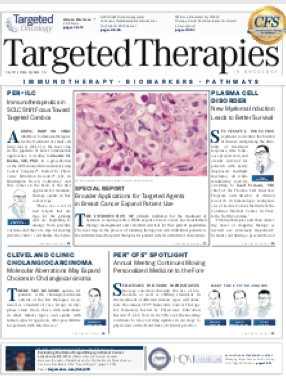Annual Meeting Continues Moving Personalized Medicine to the Fore
The introduction of<strong> </strong>CDK4/6 inhibitors for the treatment of hormone receptor–positive, HER2-negative breast cancer has transformed therapy management and extended survival for this patient population. The next step in the process of tailoring therapy towards individual patients is the introduction of targeted therapies for patient subsets with driver aberrations.
Benjamin P. Levy, MD

Benjamin P. Levy, MD
The introduction ofCDK4/6 inhibitors for the treatment of hormone receptorpositive, HER2-negative breast cancer has transformed therapy management and extended survival for this patient population. The next step in the process of tailoring therapy towards individual patients is the introduction of targeted therapies for patient subsets with driver aberrations.
“Precision medicine and biomarker discovery and implementation are what we are moving toward,” Benjamin P. Levy, MD, one of the meeting cochairs as well as associate professor of oncology at The Johns Hopkins University School of Medicine and clinical director of medical oncology at the Johns Hopkins Sidney Kimmel Comprehensive Cancer Center at Sibley Memorial Hospital in Washington, DC, said in an interview withTargeted Therapies in Oncology(TTO). “This is what we will see over and over again at the meeting.”
A unique value of the meeting lies in its structure, which includes short talks on the most relevant updates of the preceding year that ensures that the data are reaching clinicians treating patients in daily practice, including oncologists, pharmacists, and nurses.
“People are getting 2 things: the state-of-the-art updates on the best way to manage these different cancers and also new treatments and how these will come into practice,” William K. Oh, MD, chief of the Division of Hematology and Medical Oncology at Mount Sinai Health System and deputy director of The Tisch Cancer Institute at the Icahn School of Medicine at Mount Sinai in New York, New York, said in an interview withTTO.
William K. Oh, MD

William K. Oh, MD
“The nice thing about CFS® is that it brings in the investigators who are heavily involved in a lot of the studies to give you their perspective on where it is going,” Adam M. Brufsky, MD, PhD, professor of medicine and associate chief of the Division of Hematology/ Oncology in the Department of Medicine at the University of Pittsburgh School of Medicine in Pennsylvania, said in his discussion withTTO. Both Brufsky and Oh will cochair the symposium with Levy from November 6 to 8, 2019, in New York, New York.
All the meeting cochairs share marked enthusiasm for this year’s keynote speaker physician Scott Gottlieb, MD, who served as Commissioner of the FDA and made real impressions, movements, and changes at the agency during his tenure.
“We have a great keynote speaker in Gottlieb, [who] started to transform the office to make drugs available rapidly for patients. Cancer has been a leading area where the FDA process has been more streamlined so that the drugs get to patients faster. I think we are going to hear about his perspective on that and what is going to happen in the future,” Oh said.
Each day of the meeting will focus on a select list of tumor types and offer resources on other areas of interest, such as a dedicated nursing track and presentations on patient-centered practices in oncology. The underlying theme through all these discussions will be the turn toward more personalized approaches for oncology treatment.
Future Directions in Immunotherapy
Newer applications for immunotherapy, as well as approaches that may help better predict responses, will be covered during this year’s CFS® meeting.
Adam M. Brufsky, MD, PhD

Adam M. Brufsky, MD, PhD
Brufsky mentioned the latest data from the phase III KEYNOTE-522 trial of pembrolizumab (Keytruda) in combination with chemotherapy for the treatment of patients with triple-negative breast cancer (TNBC). The results showed statistically significant improvements in pathologic complete response following the neo-adjuvant part of the neoadjuvant/adjuvant regimen, meeting one of the trial’s co-primary endpoints.1
“I think it is interesting what we are going to be doing with TNBC,” Brufsky said. “I think that in particular when we integrate immunotherapy, [we need to ask]: Who is eligible for it? What is the proper testing for these patients? And should we be using it?”
Similarly, the treatment of renal and urothelial cancers has seen an influx of therapeutic options that include immunotherapy, but questions remain regarding proper sequencing.
“One of the real issues and challenges is [determining] when to use these drugs,” said Oh, who is moderator of the genitourinary cancers track at CFS®. “We are going to have conversations with real-world experts around sequencing treatments in renal and bladder cancer based on molecular changes, clinical factors, and the availability of drugs.”
And although immunotherapies have become a standard option in the treatment of lung cancer, Levy noted the exciting work around the identification of biomarkers that may predict lack of efficacy of these agents.
He cited one retrospective, multicenter international study in which patients with metastatic non-squamous nonsmall cell lung cancer (NSCLC) were evaluated for response to pemetrexed/ carboplatin with or without pembrolizumab. The results showed that patients withSTK11mutations, a known predictor of poor immunotherapy responses, had shorter progression-free survival (PFS) with the chemoimmunotherapy combination than patients with wild-typeSTK11with even stronger effects on PFS observed in patients with genomic alterations inKEAP1. When investigators examined these tumor characteristics in patients treated with chemotherapy alone, they observed little or no difference in PFS between the 2 groups.2
“The area that I think is important is looking at biomarkers across the board...[specifically] looking at biomarkers that may predict lack of efficacy to immunotherapy,” Levy said.
Biomarkers for Therapy Selection
The availability of targeted therapies with new or supplemental indications across tumor types means additional testing will be required across specialties.
As these advancements apply to the treatment of prostate cancer, Oh said, “In the future, [there is] going to be more understanding of the molecular alterations in cancer...and maybe ‘subsetting’ [of] patients into groups where different treatments will be applied based on whatever driver mutations [they have].”
To this point, he cited positive results of the PROfound trial, which showed a statistically significant and clinically meaningful improvement in its primary endpoint of radiographic PFS with the PARP inhibitor olaparib (Lynparza) versus enzalutamide (Xtandi) or abiraterone (Zytiga) in men with metastatic castration-resistant prostate cancer selected forBRCA1/2orATMmutations.3Currently, olaparib is approved in the United States for indications in ovarian and breast cancers.
Speaking to the newer targeted therapies, Brufsky pointed to the last session in the breast cancer track at CFS®, which he will moderate, dedicated to PI3K inhibitors. In May of this year, the FDA approved alpelisib (Piqray), the first PI3K inhibitor for the treatment ofPIK3CA-mutant hormone receptorpositive, HER2-negative advanced or metastatic breast cancer.4Prior to this approval,PIK3CAhad proved to be an elusive target in breast cancer, with numerous agents under development showing less-than-stellar efficacy for this patient population.5
In the treatment of lung cancer, Levy said, there are just as many reasons to celebrate, with new therapies for previously untreatable mutations now showing optimism.
“There is a growing list of genotypes within lung cancer that we have identified as relevant and, more important, that we have discovered new therapies for,” Levy, who will serve as moderator for the lung cancer track, commented. “We try to highlight those particular genotypes that are important, given the new drugs that are making their way to the clinical space.”
As an example, Levy cited the KRAS inhibitor AMG 510, which has demonstrated a positive response in the first-in-human, phase I dose- escalation trial involving patients with locally advanced or metastatic NSCLC withKRASG12C mutations. In data presented at the 2019 WCLC, 23 patients who were evaluable for response had an objective response rate of 54%, with dis- ease control achieved in all but 1 patient (96%).6
Shifting Paradigms
A trend echoed by all 3 meeting cochairs was the changing attitude toward the treatment of different cancers, one that now encourages following a personalized approach earlier in the course of treatment while in turn pushing chemotherapy to later lines of treatment.
“Chemotherapy is still utilized in a large majority of our patients, either as first-line or second-line [treatment], and even for patients with genetic aberrations,” Levy said. “The whole movement in oncology, and specifically in thoracic oncology, is to developing novel drugs that will hopefully allow us to move away from chemotherapy.”
Brufsky highlighted some agents used for the treatment of breast cancer, such as T-DM1 (ado-trastuzumab emtansine; Kadcyla) in HER2-positive breast cancer and sacituzumab govitecan in TNBC, that may be administered until disease progression in metastatic disease.
“The evolution of these data over the past couple of years [shows] we are starting to turn metastatic breast cancer into a more chronic disease...and what we are trying to do now is maximize the benefit but minimize the toxicity in a lot of new therapies,” Brufsky said. “These are agents that people could be on for a while. They do not have as much toxicity as some of the standard systemic chemotherapy agents.”
Oh mirrored this sentiment by reviewing findings of the ENZAMET trial, a randomized phase III study evaluating testosterone suppression plus either enzalutamide or placebo in patients with metastatic hormone-sensitive prostate cancer, which showed the combination improved time to progression and overall survival. An analysis of a prespecified subgroup of patients showed that most of the benefit was limited to patients who did not receive concurrent docetaxel.7
“Perhaps there is some cross benefit between chemotherapy and [androgen receptor]targeted therapies, such that you can use either/or but not necessarily get benefit from doing both,” said Oh. He also mentioned that these results will likely lead to enzalutamide as a new standard of care for this patient population.
Speaking to the advancements seen across tumor types with newer targeted and immunotherapeutic agents, Levy said many patients will still experience disease progression and that for these later lines of therapy, chemotherapy remains a relevant option. However, current research will continue to introduce novel options for each stage of therapy sequencing.
“I think that is the new area [of interest of] how can we get away from using chemotherapy in the refractory space by looking at either novel targeted therapies or immunotherapies,” Levy said. “There has been a steep curve in the past 5 years of more and more efforts moving away from [chemotherapy]. Again, the reality is that chemotherapy is still used in a lot of patients with advanced nonsmall cell lung cancer. But I think the movement is trying to steer [us] away from that as best we can.”
References
- Merck’s Keytruda (pembrolizumab) in combination with chemotherapy met primary endpoint of pathological complete response (pCR) in pivotal phase 3 KEYNOTE-522 trial in patients with triple-negative breast cancer (TNBC) [news release]. Kenilworth, NJ: Merck; July 29, 2019. bit.ly/330fv0I. Accessed July 29, 2019.
- Skoulidis F, Arbour KC, Hellman M, et al. STK11/LKB1 genomic alterations are associated with inferior clinical outcomes with chemo-immunotherapy in non-squamous NSCLC. Presented at: 2019 International Association for the Study of Lung Cancer World Conference on Lung Cancer; September 7-10, 2019; Barcelona, Spain. Abstract MA111.
- Lynparza phase III PROfound trial in HRR* mutation-selected metastatic castration-resistant prostate cancer met primary endpoint [news release]. Kenilworth, NJ: AstraZeneca and MSD Inc; August 7, 2019. bit.ly/2YNczoS. Accessed September 16, 2019.
- FDA approves alpelisib for metastatic breast cancer. FDA website. bit.ly/30Lzsak. Published May 24, 2019. Accessed September 16, 2019.
- André F, Ciruelos E, Rubovszky G, et al; SOLAR-1 Study Group. Alpelisib forPIK3CA-mutated, hormone receptor-positive advanced breast cancer.N Engl J Med. 2019;380(20):1929-1940. doi: 10.1056/NEJMoa1813904.
- Govindan R, Fakih M, Price T, et al. Phase 1 study of safety, tolerability, PK and efficacy of AMG 510, a novel KRAS G12C inhibitor, evaluated in NSCLC. Presented at: 2019 International Association for the Study of Lung Cancer World Conference on Lung Cancer; September 7-10, 2019; Barcelona, Spain. Abstract OA02.02.
- Sweeney C, Martin AJ, Zielinski RR, et al. Overall survival (OS) results of the phase III randomized trial of standard-of-care therapy with or without enzalutamide for metastatic hormone-sensitive prostate cancer (mHSPC): ENZAMET (ANZUP 1304), an ANZUP-led international cooperative group trial.J Clin Oncol. 2019;37(suppl 18; abstr LBA2). doi: 10.1200/JCO.2019.37.18_suppl.LBA2.

Powell Reviews Updated IO/TKI Data and AE Management in Endometrial Cancer
April 18th 2024During a Case-Based Roundtable® event, Matthew A. Powell, MD, discussed the case of a patient with advanced endometrial cancer treated with lenvatinib plus pembrolizumab who experienced grade 2 treatment-related hypertension.
Read More